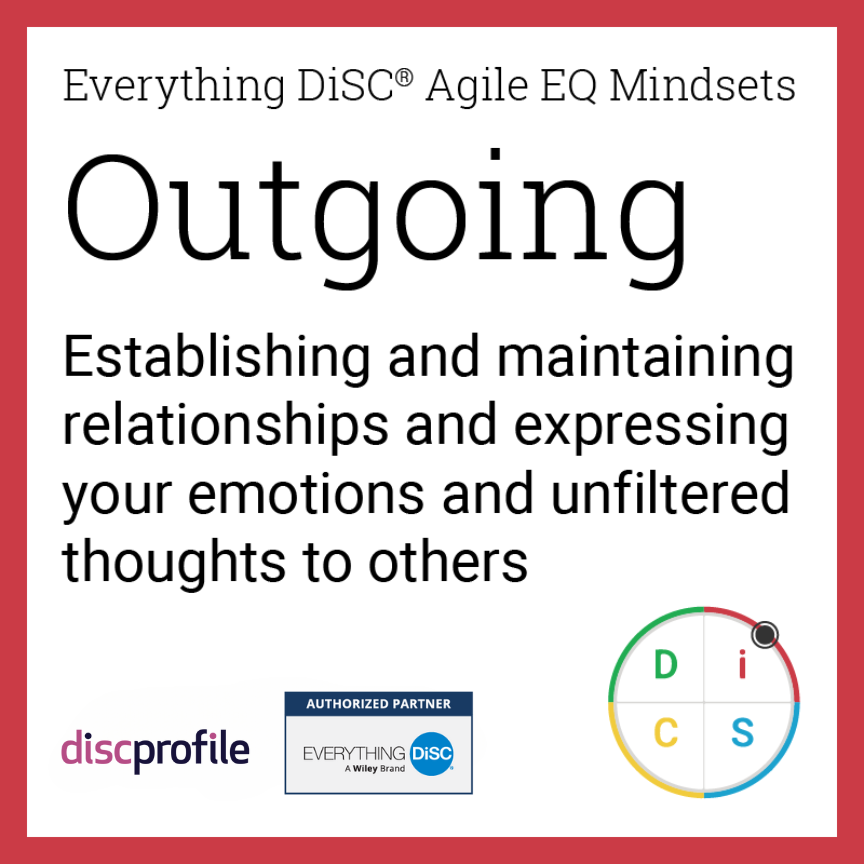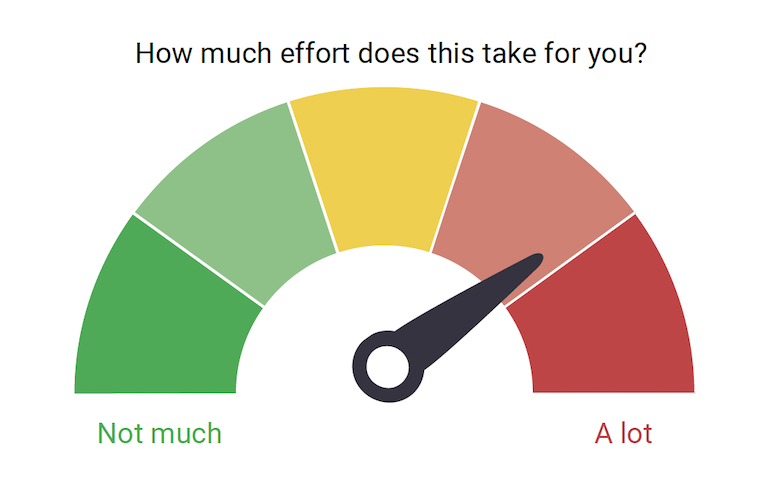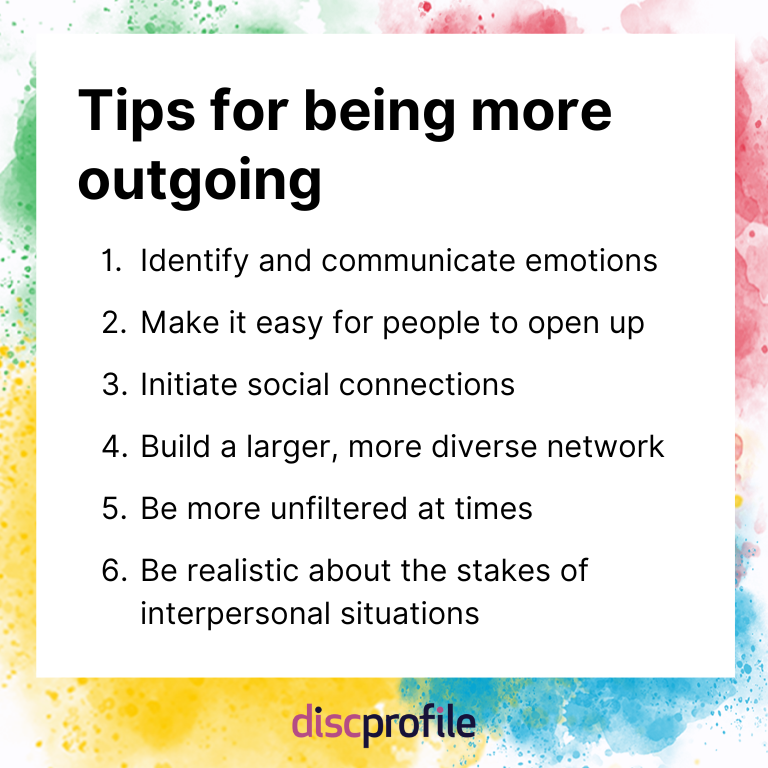How to Be More Outgoing

Key Takeaways
- People with outgoing personalities care about building relationships and expressing unfiltered thoughts.
- People of all personality types may want to call upon the outgoing mindset when networking, deepening relationships, or generating team spirit.
- Practice being outgoing by initiating connections, sharing your opinions, and making it easy for others to open up, among other tips.
What defines an outgoing personality?
“I reach out to others.”
For people with outgoing mindsets, it’s about connection—everyone is a potential friend. They reach out, initiating social and professional contacts. They prioritize relationships and make space for people even when they’re busy.
Outgoing people are more willing than others to let their guard down and speak in an unfiltered way, building trust and making it easier for others to open up as well. They are candid and generally self-confident, saying what they’re really thinking. These folks often project an upbeat and welcoming attitude that brings people together and makes them feel included.
An outgoing personality often aligns with the DiSC® i style. It is one of the eight mindsets described in Everything DiSC® Agile EQ™.
Source: Everything DiSC Agile EQ
Why are some people more outgoing?
A person’s tendencies are built upon the needs they satisfy. People with naturally outgoing outlooks feel comfortable in that space because it helps them meet their need for:
- connection
- a friendly environment
- acceptance
- social influence
- being at the center of the action
Benefits of an outgoing mindset
Whether being outgoing is natural for you or takes effort, it has many benefits. Being outgoing allows you to:
- create stronger, more rewarding relationships
- build trust and open channels of communication
- develop a network of allies you can draw on for support
- foster a sense of camaraderie and inclusion
- energize those around you with your optimism and team spirit
- understand other people better (and misunderstand them less)
Gaining comfort with the outgoing mindset will have different benefits for people of different DiSC styles.
People with i styles usually feel pretty at home with this frame of mind. For others, being outgoing means taking a bit of social risk and redirecting energy toward reaching out to others and connecting in an honest way. Redirecting energy in this way often pays off.
- C styles, for example, may prefer to work alone, but almost no one truly works alone, so taking the time to build strong relationships can minimize inefficiencies and misunderstandings down the road.
- D styles will see the long-term benefits of building a network of support as they work toward their goals.
- S styles are often inclined to weigh their words carefully for fear of saying the wrong thing, but this can be an exhausting way to approach interactions. They may discover that letting down their guard a bit actually uses less energy and opens up new opportunities.

Situations in which being more outgoing might be helpful
Perceiving the best mindset for the situation at hand is the key to agile emotional intelligence. Once you gain familiarity with all the mindsets available to you and when they may be most useful, you’ll be able to adapt your approach to the needs of each interaction. In general, you might try to get into an outgoing mindset when:
- networking
- establishing new relationships
- developing trust
- deepening working relationships
- generating team spirit
- showing others you are interested in what they have to say
Limitations of the outgoing mindset
When you feel comfortable in a certain mindset, you often forget that there are other options for how to approach a given situation. If you rely too much on being outgoing, rather than adapting to the situation, you might:
- press people to open up before they are ready
- be overly trusting
- overshare in ways you later regret
- focus so much on relationships you neglect other responsibilities
- overvalue a friendly atmosphere when a bit of conflict could be productive
- be overly blunt, potentially alienating people
- monopolize conversations
Understand why it’s hard for you to be more outgoing
Obstacles to being more outgoing vary from person to person. This means that learning how to be more outgoing will look different for everyone. We recommend taking the Everything DiSC Agile EQ assessment to see where your “effort meter” is for the outgoing mindset (see sample profile). Agile EQ reports are highly personalized, but here is some general guidance for those wishing to be more outgoing.

Recognize your thoughts
To be more outgoing, you may have to challenge thoughts like:
- I don’t have anything interesting to say.
- I’ve got more important things to do than socialize.
- I’m not letting them see this side of me.
- They won’t respect me if I lower my guard.
- This is a workplace, not a social club.
- I need to be careful about what I let slip out.
These thoughts are often happening under the surface, so you’ll need to notice when they pop up.
Set goals
From there, you can set some goals. They’ll look different for everyone, but some samples are:
- I don’t hesitate to talk about myself in front of others.
- I’m willing to share my feelings, even ones that make me feel vulnerable.
- When appropriate, I adapt my communication style to make others more comfortable.
- I carve out time to give encouragement to my teammates.
- I initiate social events on a regular basis.
- I’m typically comfortable at networking events.
6 tips for becoming more outgoing
People of different styles will work toward those goals in their own ways, but in general you can become more outgoing by: identifying and communicating your emotions, opening up and encouraging others to do the same, being more unfiltered, and taking social initiative.
1. Identify and communicate your emotions
Being more outgoing starts with self-awareness. According to emotional intelligence research by Daniel Goleman, recognizing and naming your own emotions is a foundational skill that improves interpersonal communication and empathy.
When you’re able to say, “I’m feeling a little nervous about this presentation” or “I’m really excited to be here,” you signal openness and authenticity. This kind of emotional transparency fosters trust and connection, making others more likely to engage with you in return.
2. Make it easy for other people to open up
Outgoing people aren’t just good at expressing themselves—they’re also skilled at creating space for others to feel heard. People open up more when they feel psychologically safe and when conversations are structured to allow mutual sharing. Active listening strategies like asking open-ended questions, maintaining welcoming body language, and showing genuine curiosity help reduce social anxiety in others and build a sense of rapport.
You may need to be a bit less subtle with your physical cues when communicating over video. On a video call, you lose 90 percent of the nonverbal cues you get in person.
Give people “the gift of going first” in conversations
If you’re not naturally outgoing, being the first to introduce yourself, share something personal, or admit uncertainty can feel like a big social risk. But taking this risk means others often follow suit, creating deeper, more authentic exchanges. This is sometimes positioned as the “gift of going first” because it relieves pressure for others and makes social interactions smoother.
3. Be the one to initiate connections and keep the momentum going
Research consistently shows that people tend to underestimate how much others enjoy their company—a phenomenon called the “liking gap.” That means people are often more receptive to social invitations than we assume. By taking the initiative to organize coffee chats, team lunches, or group outings, you not only strengthen relationships but also model outgoing behavior that others can emulate. Here are some ways to maintain social momentum:
- Follow up after hanging out. It was so good to see you today is always a nice text to get. Beyond that, you can keep the social momentum by scheduling another time to get together or continuing a conversation you started. Here’s a link to that article I was talking about. Or, That project you’re working on with marketing sounds so interesting. Will you let me know how the presentation goes?
- Schedule regular events. It’s wild how quickly months can go by after you and a friend agree to “meet up soon!” Getting something regular on the calendar, even if it’s once every few months, helps make sure you don’t lose touch.
- Block off time for reaching out. There is no shame in putting friendship tasks on your calendar or to-do list. Texting your friend to see how their weekend was is not less authentic because you set an alert to do so. On your calendar, block off 30 minutes a few times a week to devote to answering that lingering email from your aunt, calling a friend, or finding networking events to register for. Prioritizing personal connections in this way is good for your emotional health, and lets people in your life know they are important to you.
4. Build a larger network of connections
The more people you know, the more social opportunities you'll have to practice an outgoing mindset. Research by Ronald S. Burt and others shows benefits of diverse social networks (open rather than closed networks). These benefits include social well-being, advancement at work, and better long-term strategic thinking.
Building your network doesn’t have to be transactional. Think of it as accumulating micro-connections that, over time, make socializing easier and more natural.
Read more: Networking 101
5. Share your opinions openly and be more unfiltered
Many people hold back in conversations out of fear of being judged, misunderstood, or simply “getting it wrong.” But research shows that speaking up—even when your opinion isn’t perfectly polished—signals confidence and authenticity. Over time, regularly contributing your thoughts helps you internalize a sense of self-efficacy, which builds your confidence and helps others see you as a valuable and engaged contributor. It’s not about always having the “right” answer—it’s about being willing to participate in the conversation.
Being outgoing means showing more of your true self. This doesn’t mean oversharing—it means choosing to let your personality come through and trusting that it’s enough. When you drop some of the social filters that make you overly cautious, you become more relatable.
6. Be realistic about the stakes
You say something awkward at the proverbial water cooler. You talk too much or too little at a friend’s dinner party. You decide to try something new and end up not liking it. You reach out to an acquaintance and they don’t respond. So what? What is really at stake here?
“A lot!,” you might say, and detail the chain of bad consequences that could domino out from something you said or did. But—without minimizing those concerns, or the importance of small interactions—the fact is that very rarely does the fate of a nation rest on your coffee break banter (unless you have a very different job than most of us . . . ).
One way to develop a realistic view of the stakes of social situations is to think of a recent conversation where you didn’t speak up, or a recent social opportunity you turned down for fear of messing up. Imagine you had spoken up, or had gone to the event. Write down the worst-case reaction, and the best. Next time a similar opportunity comes, take it. Then compare the results with what you wrote down. Chances are, what actually happened was not the best or worst scenario, but somewhere in between, because that’s how life usually works.
Interrupting someone at happy hour is not the end of the world. And if something awkward happens, turn it into an opportunity to follow up with the friend or colleague in question: Sorry—I feel like I interrupted you a lot at happy hour yesterday. My people skills are still a bit rusty after leave! Can we meet up again soon?

Even for people on the other side of the DiSC model, there’s a way to be more outgoing while still being authentically you. If you are naturally composed, tapping into the outgoing mindset during a conversation doesn’t mean you’re suddenly super lively. It may just mean you remember to say what you are thinking instead of deferring or clamming up. Or you text someone to check in and say hi, instead of waiting for them to text first.
You can activate different parts of your personality countless times throughout the day without changing who you are.
Posted 09/30/2020, Last Updated 04/04/2025







